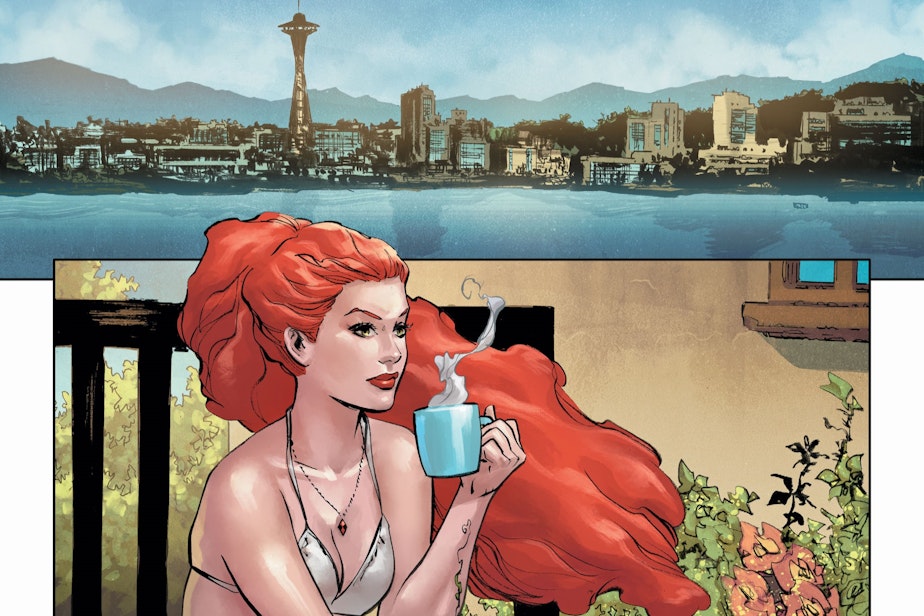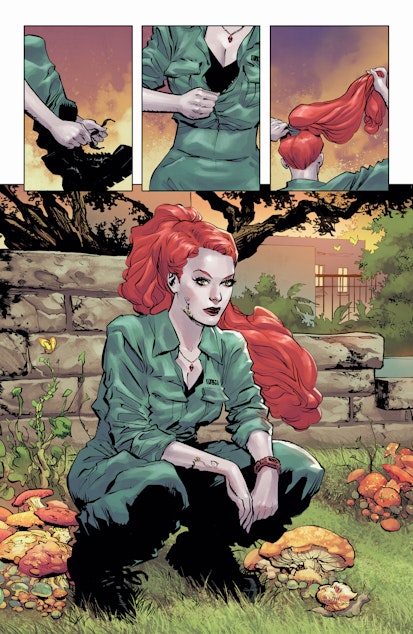DC Comics’ Poison Ivy is an ecoterrorist — and the anti-hero the Pacific Northwest needs

DC Comics’ Poison Ivy made comic book debut in June 1966: “Trouble between the dynamic duo,” the cover read, featuring Batman and Robin glaring at each other over an early Ivy adaption – “Is she the cause?”
Decades later, Poison Ivy is still the cause of a good deal of trouble. But rather than playing a somewhat shallow seductress, she’s starring as a complicated anti-hero in her own storyline.
Seattle writer G. Willow Wilson was tapped to reimagine the DC villain, first in a six-issue limited Poison Ivy miniseries, then another six. The story took root among comic book fans, and now it’s grown into the character’s first ongoing series, a series that gives Wilson time and space to develop a character that fits well into today’s discourse.
RELATED: Seattle's Emerald City Comic Con was an overwhelming joy for this budding fan
“Poison Ivy is just such a fascinating character who gets, sadly, more and more germane every day given what's happening with climate change,” Wilson told KUOW this week, ahead of the Emerald City Comic Con. “It's a book whose time has come, and I'm just glad that it's found its audience.”
Arianna Turturro, who edits DC’s Poison Ivy comic book series, told KUOW it’s the first time anyone has told Poison Ivy’s origin in so much detail.
Wilson’s storytelling is accentuated by Marcio Takara’s bold illustrations. They jump off the page with violent splashes of red and every shade of green. Poison Ivy’s powers are accentuated with intricate illustrations of warped fungi, monstrous plants, and more delicate details, like flowers among gore.
Sponsored
Poison Ivy, whose real name is Pamela, has a new look to blend in with the world outside Gotham City, which she left after a series of unfortunate events involving the Bat Family. The form-fitting, leafy bustier and sheer green tights of the 1966 era (also: Uma Thurman’s adaptation in “Batman & Robin” in 1997) have been swapped for an olive-green boiler suit and work boots. Her big red hair is still wild, though occasionally tied back in a ponytail while she tends to plants and various punks.
That’s not to say her rather suggestive nature is gone entirely. When Pam lets loose the lamia spores that give her her amped up powers, Takara’s art takes on the effect of a nightmarish hallucination, featuring Poison Ivy in all her fearsome yet seductive glory.

"Marcio came back with these absolutely wild costume designs, several of them, and we kind of picked the one that fit best,” Wilson said of the process behind designing this adaptation of Poison Ivy.
Sponsored
It’s painstaking work for Marcio Takara, and some artists aren’t cut out for it when Takara needs a break – it's too physical and, for the faint of heart, “too gross,” Wilson said.
“Marcio, nothing makes that man flinch,” she said. “We've had conversations where I'm like, ‘You know, I thought this was gross, and then you sent it back and it was, like, three times grosser than what I was envisioning.’ And he's like, ‘No, it was in the script. You literally wrote, like, XYZ explodes and guts go everywhere.’"
(Queasy readers, be advised: Plants and fungi often appear out of, well, all sorts of body parts and orifices.)
RELATED: The (economic) force is strong with Emerald City Comic Con in Seattle
Body horror aside, Poison Ivy is witty, thoughtful about the state of the world, and poignant about topics that appeal to Pacific Northwesterners.
Sponsored
This chapter of Poison Ivy’s life takes her on a journey across the country to Seattle, where, spoiler alert, she intends to use the shipping industry to spread her deadly lamia spores around the world.
Those who have been reading the series know the story has progressed beyond that plot. The series stays true to the PNW vibe, though, with themes of environmental activism, the effects of gentrification and land development, modern relationship dynamics, and others that feel distinctly of this region.

And as the effects of the changing climate grow more urgent, Wilson said, readers may find Poison Ivy’s tactics easier to understand – even if she's fighting major industrial titans using less-than-legal means.
“Can we really think of her as a villain in this day and age?” Wilson pondered.
Sponsored
Poison Ivy has evolved beyond the sultry “man trap” she was once type-cast as. Though matters have taken her back to Gotham City, spoiler alert, and her girlfriend Harley Quinn, Wilson said she might just have to make another trip out West to continue her transformation.
“I tell you what, that is not off the table,” Wilson teased. "She really is, in so many ways, a Pacific Northwest character – you know, personality-wise, her color palette. ... So yes, it’s a distinct possibility that that we will see more of her in the Pacific Northwest, where she has unfinished business.”




